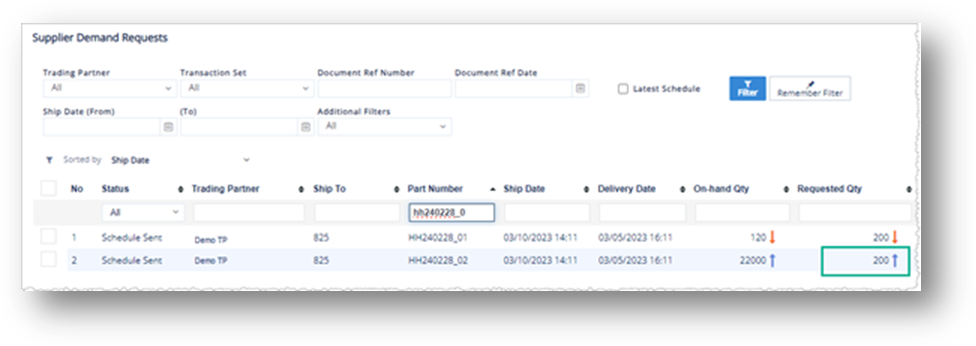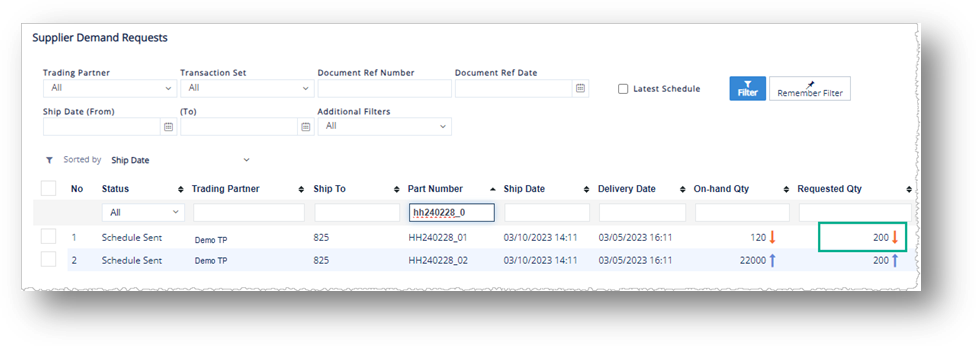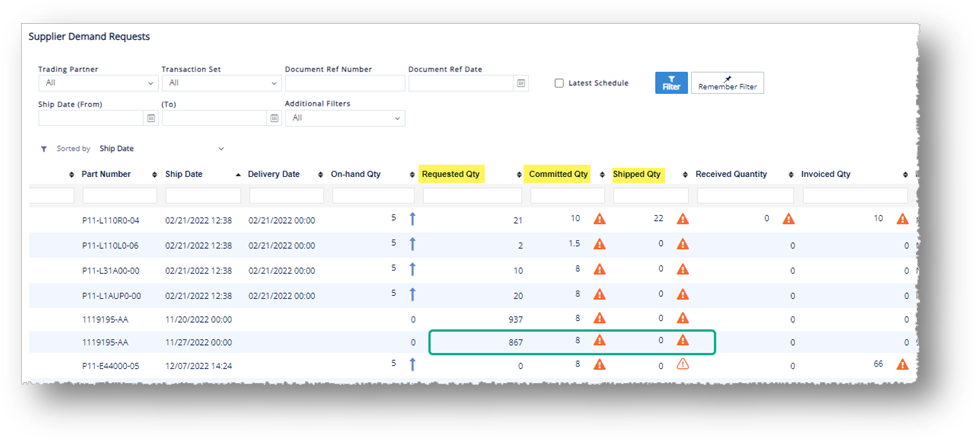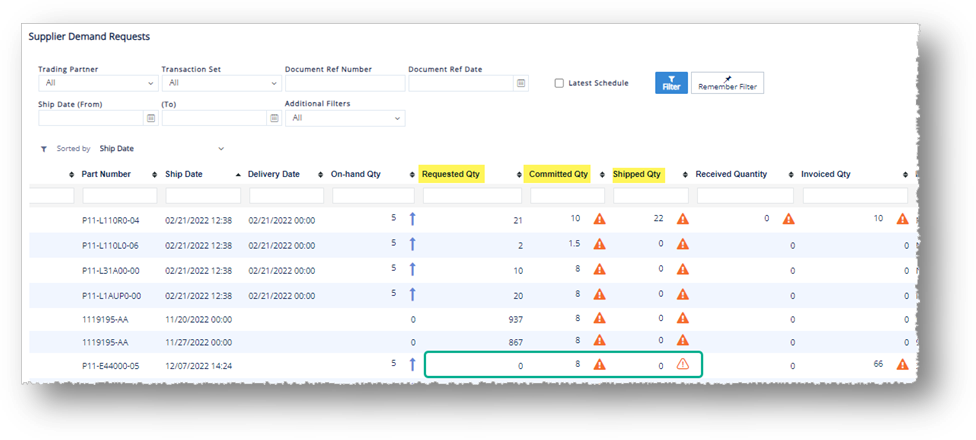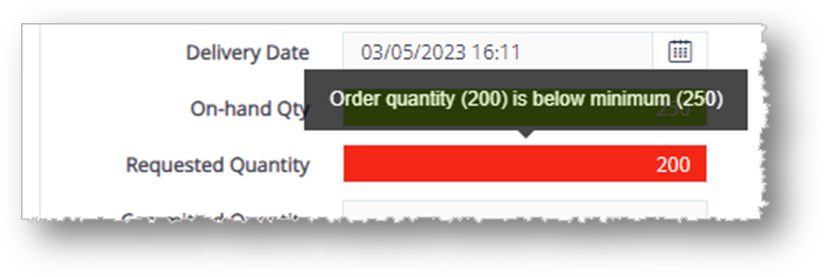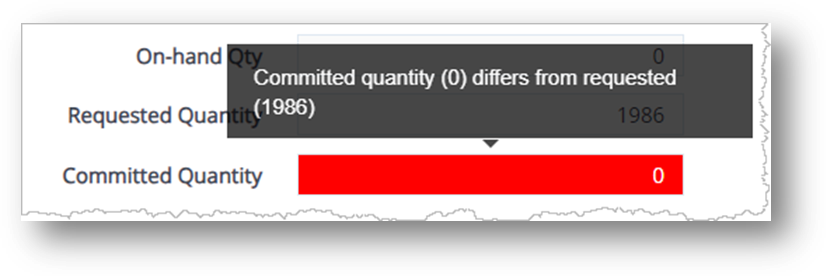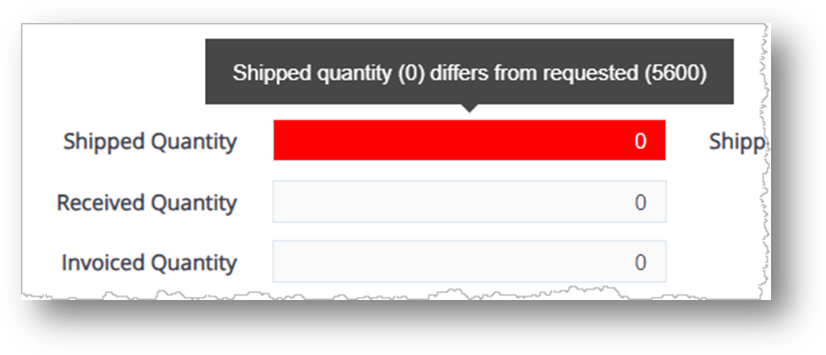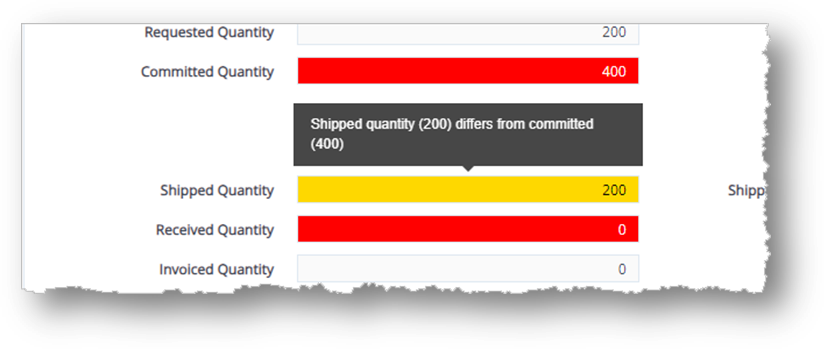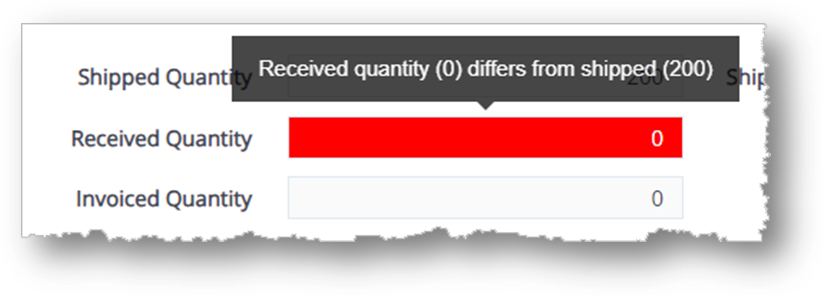Demand Requests
At this time, the Demand Requests feature only allows buyers to view the requests sent to suppliers. All information in the Demand Request is taken from incoming documents.
Main Topics:
View a Demand Request
1. On the Supplier Demand Mgt menu, click Demand Requests.
2. On the Supplier Demand Requests screen, click the item that you want to view.
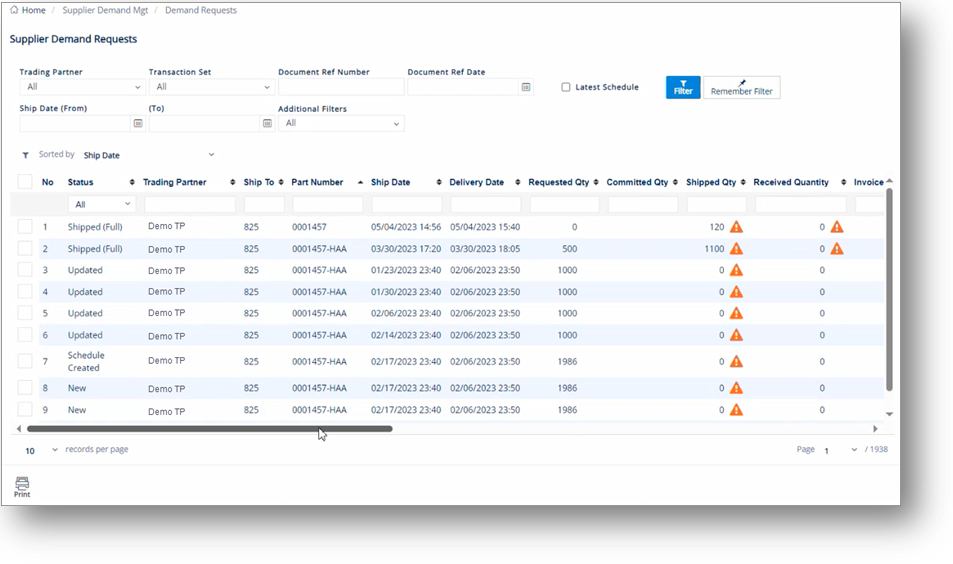
TIP Scroll to the right to view more fields on the screen.
3. On the Supplier Demand Requests screen, select the General, Inner Packs, Received Shipment, Product Receipt, Other Info, and History tabs to view the corresponding details.
GENERAL tab
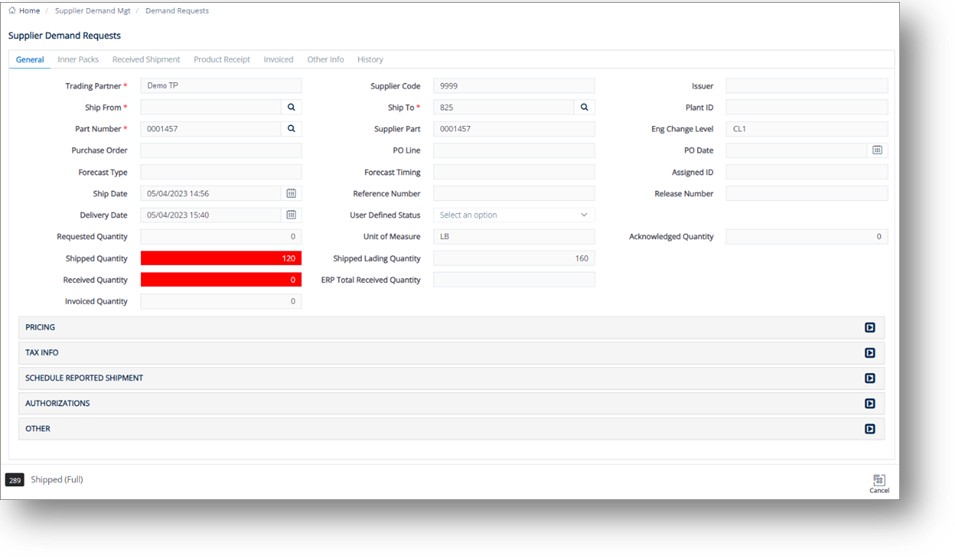
TIP You can scroll down to view more fields on the General tab. For a full description of each field, refer to the Field Definitions-General in the next section.
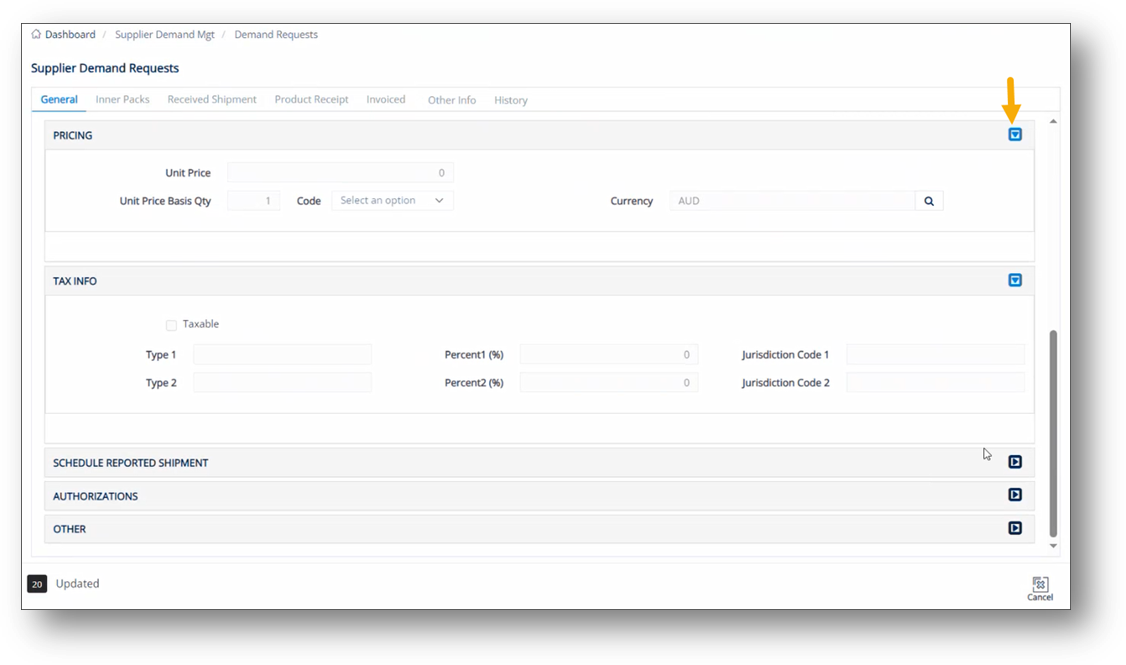
Inner Pack tab
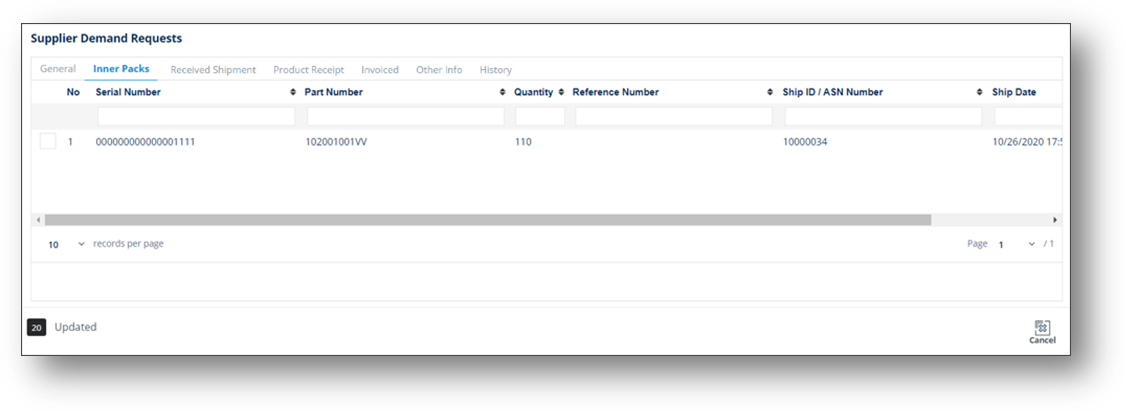
Received Shipment tab
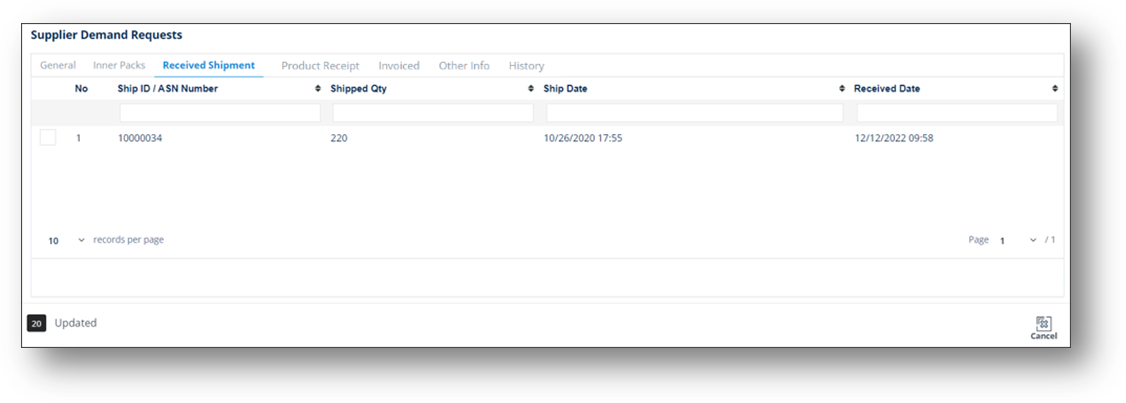
|
NOTE Information on the Received Shipment tab is also linked to the one in the Shipment Receiving feature of the Supplier Receiving module. For more information, see Shipment Receiving. |
Product Receipt tab
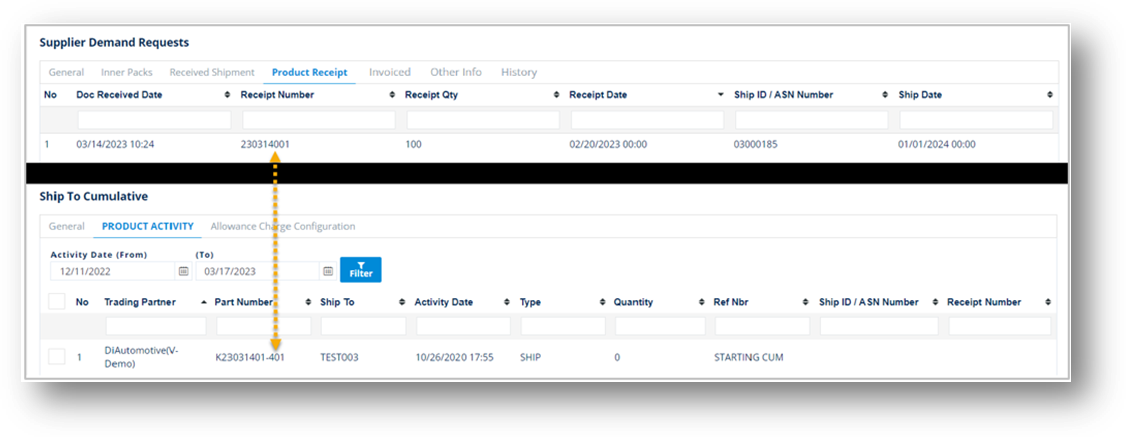
|
NOTE The Receipt Number on the Product Receipt tab of the Supplier Demand Requests module is the Part Number on the PRODUCT ACTIVITY tab of the Ship To Cumulatives module. |
Invoiced tab
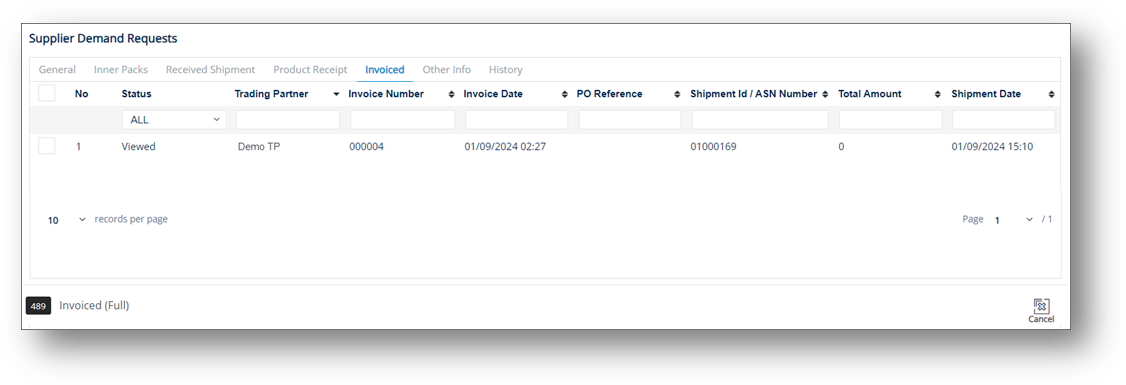
Other Info tab
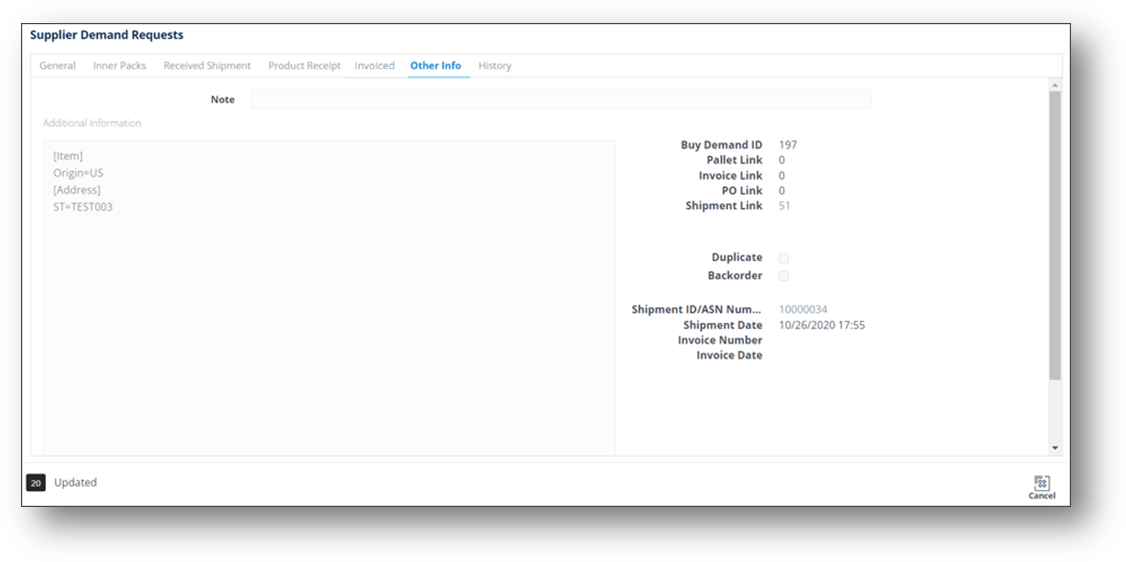
History tab
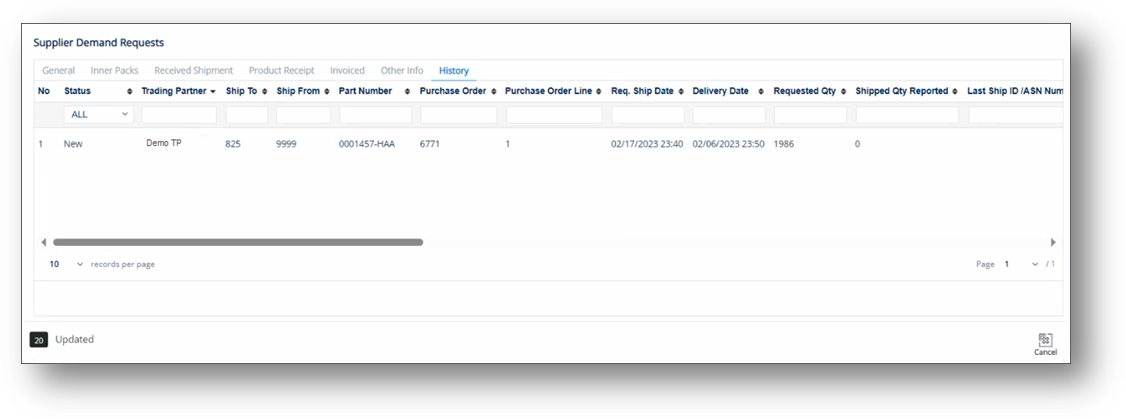
Field Definitions - General
|
Field |
Definition |
|
Trading Partner |
The ID code of the Trading Partner. |
|
Ship From |
The address code of the supplier (your address). |
|
Part Number |
The Trading Partner's requested part number, found on the EDI release. |
|
Purchase Order |
The document reference number of the Purchase Order. |
|
Timing |
Timing of the shipment. |
|
Req. Ship Date |
The date when the Trading Partner wants the order to be shipped, found on the EDI release. |
|
Delivery Date |
The projected date when the parts will arrive at the Ship To location. |
|
User Defined Status |
Select a pre-configured status in the dropdown list. Contact the TrueAuto Support team to set up the statuses that you want to define. |
|
On-hand Qty |
The quantity of a specific item currently in the warehouse. |
|
Requested Quantity |
Ordered quantity from Buyer. |
|
Shipped Quantity |
The number of units shipped, or staged to ship on the Shipment (ASN) |
|
Received Quantity |
The actual quantity received/arrived at the Trading Partner's location. |
|
Invoiced Quantity |
The quantity entitled for payment claim in Invoice. |
|
Supplier Code |
Your Supplier Code assigned by the Trading Partner. |
|
Ship To |
The Ship To code representing the customer’s address. |
|
Supplier Part |
The supplier’s SKU or the internal part number used to cross-reference when you export to an ERP/MRP Inventory Control system. |
|
Purchase Order Line |
A data line/row of a purchase order. |
|
Reference Number |
The reference number from the original document if shown on the EDI release. This has multiple uses, such as identifying each line item of a PO. For example, Delivery Order Number. |
|
Our Ship Date |
Your date when the order is to be shipped. |
|
Our Del. Date |
Your date when the parts will arrive at the Ship To location. |
|
Unit of Measure |
The unit of measure used. |
|
Shipped Lading Quantity |
The quantity/number of Shipped Pallet or Stand-alone containers. |
|
Issuer |
Usually the issuer. |
|
Plant ID |
The identifier of the company. |
|
Assigned ID |
The Line Number or assigned ID for invoices and POs as shown on the EDI release. |
|
PO Date |
The date when the purchase order was created. |
|
Release Number |
The number of the material release document. |
|
Eng Change Level |
The engineering/design change code for the part ordered. |
|
Acknowledged Quantity |
The quantity that is known/accepted (in number) by the Trading Partner. |
Field Definitions - PRICING
|
Field |
Definition |
|
Unit Price |
Price of an individual piece. |
|
Unit Price Basis Qty |
The quantity used as a base for calculating Unit Price. For example: $1 for 10 pounds. |
|
Currency |
The currency code. |
Field Definitions - TAX INFO
|
Field |
Definition |
|
Type 1 |
First Tax type. |
|
Percent 1 (%) |
Percentage of first Tax type. |
|
Jurisdiction Code 1 |
Tax jurisdiction code 1. |
|
Type 2 |
Second Tax type. |
|
Percent 2 (%) |
Percentage of second Tax type. |
|
Jurisdiction Code 2 |
Tax jurisdiction code 2. |
Field Definitions - SCHEDULE REPORTED SHIPMENT
|
Field |
Definition |
|
Quantity |
- Last Quantity: Qualifier for the quantity in the following field – choose if the quantity was shipped or received from this Trading Partner. o 011: Shipped o 050: Received |
|
Qualifier |
Type of shipment. - C: Firm - D: Planning |
|
Cumulative Quantity |
Qualifier for the cumulative quantity shipped/received from this Trading Partner. |
|
Date |
Date of the last ASN. |
|
Start Date |
Start date of this cumulative quantity. |
|
Through Date |
Cumulative quantity through this date. |
|
Shipment ID/ASN Number |
Shipment identifier or ASN number. |
Field Definitions - AUTHORIZATIONS
|
Field |
Definition |
|
Quantity |
- Finished Goods Authorization: Authorize quantity parameters for finished goods. - Raw Materials Authorization: Authorize quantity parameters for raw materials. - Cum Prior to Shipment: Authorize cumulative quantity parameters before receiving the shipment. |
|
Start Date |
- Finished Goods Authorization: Start date of quantity parameters for finished goods. - Raw Materials Authorization: Start date of quantity parameters for raw materials. - Cum Prior to Shipment: Start date of cumulative quantity parameters before receiving the shipment. |
|
End Date |
- Finished Goods Authorization: End date of quantity parameters for finished goods. - Raw Materials Authorization: End date of quantity parameters for raw materials. - Cum Prior to Shipment: End date of cumulative quantity parameters before receiving the shipment. |
Field Definitions - OTHER
|
Field |
Definition |
|
Pickup Date |
The date when the part/product was picked up after the shipment arrived at the destination. |
|
Received Date |
The date when the part number was received. |
|
Part Type |
Unique identifying codes assigned to each part type if shown on the EDI release. |
|
Substitute Part |
The vendor replacement part or alternate part number. |
|
Product ID |
The Product Identifier. |
|
Job Sequence |
The order in which to load containers on a trailer or pack parts in a container. |
|
Line Feed |
The Line Feed location from the order as shown on the EDI release. |
|
Reserve LF |
The Reserve Line Feed, if any. |
|
Order Status |
The codes that TrueAuto uses to assign the Firm Order’s status. |
|
Shipped Part |
The parts shipped. |
|
Dock Number |
Larger plants may have one Ship To, but multiple receiving docks. If used, this number is found on the EDI release. |
|
Truck Route |
Some Trading Partners provide truck routing information. If used, this number is found on the EDI release and depending on the specifications, it may be added to the ASN’s Carrier field. |
|
Project Number |
The number of the involved project. |
|
Created Date |
The date when the order was created. |
|
Modified Date |
The date when the order record was changed. |
|
Invoiced Date |
The date of issuing bill/invoice. |
|
Amount Invoiced |
The total paid amount declared in Billing/Invoice. |
|
Transaction Type |
The type of any business transaction, e.g., in X12, Purchase Order transaction known as 850, in EDIFACT as an ORDER. |
|
Purpose |
The order’s purpose code. |
|
Document |
The Document Reference Number in EDI. For example, the Document Ref. No. of the EDI 862 document is BSS02. |
|
Order Received |
The date when the order was received. |
|
Appointment Number |
Shipment booking number assigned by Logistics. |
|
Quantity Type |
Indicates the basis of quantity values in shipments. A: Actual quantity, no calculations required to determine how much product to send. C: Cumulative quantity, calculations required to determine how much product to send. Common item: Id=R; Code=QTYQU; Setting=value from above. |
|
Quantity/Pack |
The number of units of a part in each shipping container. |
|
Created By |
The person who created the order. |
|
Modified By |
The user ID of the last person who saved a change to the Order. |
|
Ship Delivery Calendar Pattern |
Calendar pattern to define Ship Delivery date. |
|
Ship Delivery Time Pattern |
Time pattern to define Ship Delivery timing. |
|
Reference Qualifier |
A qualifier in EDI to define a reference note. |
|
Order Weight |
The total weight of all units in this order. |
|
Originator |
Generating source. |
View Demand Request History
This feature displays all the processing that has occurred to a demand request. After you save the changes made to a request, the previous one will be stored on the History tab.
1. On the Supplier Demand Requests screen, switch to the History tab.
2. On the History tab, click the request whose history records you want to view.
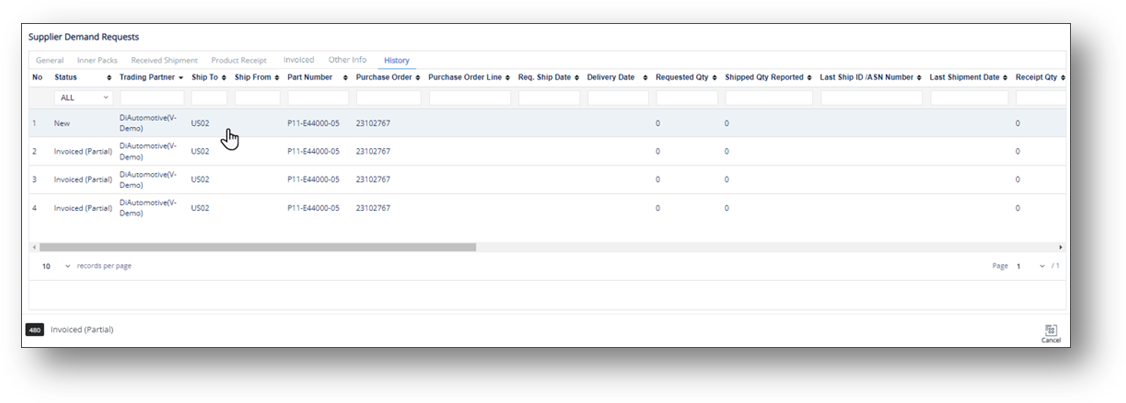
The Supplier Demand Requests History Detail window is displayed.
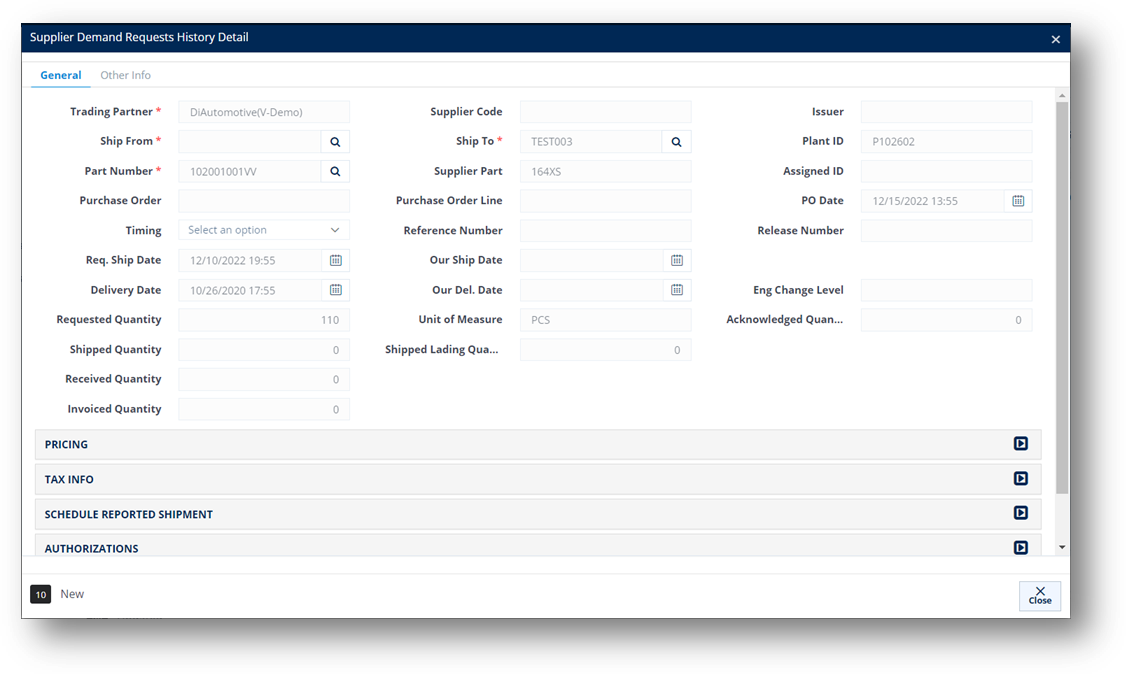
Handling Exceptions
Alert Icons
TrueAuto uses alert icons as a visual way for you to quickly identify any quantity deviations on the Supplier Demand Requests screen. Refer to the following cases:
|
Case |
Alert Icon Example |
|
If Requested Qty is above Order Qty Max, a blue up-arrow icon is used to indicate the excess. |
Requested Qty = 200 but Order Qty Max = 150
|
|
If Requested Qty is below Order Qty Min, a red down-arrow icon is used to indicate the deficiency. |
Requested Qty = 200 but Order Qty Min = 250
|
|
If Invoiced Qty differs from Received Qty, a dark orange triangle is used to indicate the quantity discrepancy. |
Invoiced Qty = 10 but Received Qty = 0
|
|
If Received Qty differs from Shipped Qty, a dark orange triangle is used to indicate the quantity discrepancy. |
Received Qty = 0 but Shipped Qty = 22
|
|
If Committed Qty differs from Requested Qty, a dark orange triangle is used to indicate the quantity discrepancy. |
Committed Qty = 10 but Requested Qty = 21
|
|
The following comparison priority is made for Ship Qty: 1) Shipped Qty versus Requested Qty 2) Shipped Qty versus Committed Qty So, to indicate the quantity discrepancy: If Shipped Qty differs from both Requested Qty and Committed Qty, a dark orange triangle is used. If Shipped Qty equals Requested Qty but differs from Committed Qty, a light orange triangle is used. This icon represents a less severe warning. |
Shipped Qty = 0, Requested Qty = 867, and Committed Qty = 8
Shipped Qty = 0, Requested Qty = 0, and Committed Qty = 8
|
Alert Colors and Tooltips
TrueAuto uses alert colors and tooltips on the Supplier Demand Requests > General tab, as visual ways for you to quickly identify a discrepancy between quantities.
Alert Colors
|
Case |
Alert Color |
|
Requested Qty is within the range between Order Qty Min and Order Qty Max. |
No color |
|
Requested Qty is below Order Qty Min. |
Red |
|
Requested Qty is above Order Qty Max. |
Blue |
Tooltips
A tooltip is a visual description of exception details that is displayed when you put the cursor over the On-hand Qty and Requested Quantity fields, which are shown in different colors. Refer to the following cases:
|
Case |
Tooltip Example |
|
Requested Quantity is below Order Qty Min.
|
|
|
Requested Quantity is above Order Qty Max.
|
|
|
Committed Quantity differs from Requested Quantity. |
|
|
Shipped Quantity differs from Requested Quantity. |
|
|
Shipped Quantity differs from Committed Quantity. |
|
|
Received Quantity differs from Shipped Quantity. |
|
|
Invoiced Quantity differs from Received Quantity. |
|
